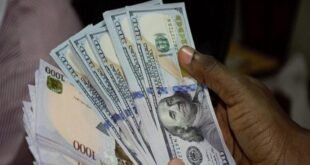The federal government has recorded an increase in 500% savings which was surprising in the first quarter of 2025, compared to the previous period, after the removal of gasoline subsidies.
This was revealed in a new report released on Tuesday by the National Orientation Agency (NOA), entitled “Two years later: Main Benefits of the Elimination of Subsidies.”
The report, which is the 45th edition of the Noa Public Enlightenment series, The Explainer, provides a comprehensive review of the economic impact of the 2023 controversial 2023 decision to end the fuel subsidy, an action said by the government has led one of the most significant fiscal reforms in the history of the new Nigeria.
According to the agency, the termination of fuel subsidies, officially implemented in October 2024, has changed the health of state finances, increasing government revenue in Q1 from ₦ 154 billion to ₦ 836 billion. This leap, he said, has empowered the Nigeria National Petroleum Company Limited (NNPCL) to send more funds to the Federation Account Allocation Committee (FAAC), significantly increases financial inflows for the federal and state government.
In a country that has long been burdened by debt related to subsidies and fiscal leaks, the impact has been transformative. The FAAC allocation to the state jumped to the record ₦ 15.26 trillion in 2024, allowing consistent salary payments and payments ₦ 1.85 trillion in subnational debt.
“Between 2005 and 2022, Nigeria spent more than $ 84 billion for gasoline subsidies, with a subsidy budget of 2022 alone balloons by 700% to ₦ 4 trillion,” Noa said in his report. “In 2023, the country spent 97% of its income for debt service. The removal of subsidies was not only on time, but also important.”
In addition to stabilizing state finances, subsidized savings have funded infrastructure projects and major development. This includes ₦ 20 trillion of national infrastructure funds, ₦ 54 billion student loans through Nelfund, ₦ 1.5 trillion for agriculture, ₦ 1 trillion for the dense mineral sector, and massive adoption of compressed natural gas (CNG) for public transportation.
One of the most striking fiscal shifts, recorded by the report, is a reversal of Nigeria’s historical expenditure patterns, where repeated expenses are often capital investment dwarf. In the 2025 budget, capital expenditure rose to ₦ 23.96 trillion, exceeding repeated expenses ₦ 13.64 trillion.
Foreign reserves have also seen an important increase, rising to $ 38.9 billion despite the ongoing forex obligation.
Describe the decision to eliminate subsidies as painful but necessary, Noa equates the process with “a woman in labor,” uncomfortable to produce a new life.
“For decades, fuel subsidies are the main Albatros in the Nigerian economy. The government is successively trying and failing to delete it, often because of political reactions. The brave step of President Tinubu, in just two years, saves the country from the potential for economic collapse,” the agency said.
Further reports emphasize that the benefits have been felt at the grassroots level. Countries that have struggled to pay salaries have become fiscal stable, even in the face of increasing minimum wage demands. In 2023, the FAAC allocation for states and local governments amounting to ₦ 6.16 trillion, an increase of 28.6% from ₦ 4.79 trillion received in 2022. That figure was almost tripling in 2024, with the state and LGA received a combination of 9.58 trillion.
“This has allowed the subnational government to not only pay salaries but also reduce debt. Total domestic debt profiles of states dropped from ₦ 5.82 trillion in June 2023 to ₦ 3.97 trillion at the end of 2024,” reported Noa.
Although there are public concerns about increasing living costs, the federal government insists that reforms laid the foundation for sustainable growth. According to Noa, the transfer of funds from subsidies to capital projects indicates a shift that has long been uploaded towards building a strong and independent economy.
 JamzNG Latest News, Gist, Entertainment in Nigeria
JamzNG Latest News, Gist, Entertainment in Nigeria









